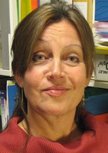Alex Mihailidis, Toronto Rehab Institute / University of Toronto

Alex Mihailidis has been conducting research in the field of pervasive computing and intelligent systems in health for the past 15 years, having published over 100 journal papers, conference papers, and abstracts in this field. He has specifically focused on the development of intelligent home systems for elder care and wellness, technology for children with autism, and adaptive tools for nurses and clinical applications. He currently holds several major research grants from internationally recognized funding agencies to support this work (including both the Canadian and American Alzheimer Associations, NSERC, and CIHR). He is also a CIHR New Investigator. Dr. Mihailidis has also co-edited two books: one from CRC Press entitled “Pervasive computing in healthcare”, and the other from IOS Press entitled “Technology and Aging”.
Louise Nygard, Karolinska Institutet

Louise Nygard has conducted research in the field of dementia since 1990, with a particular interest in the perspective of persons with dementia, especially in the early and moderately severe stages. From 1996 and continuing, she has established a research group at KI of doctoral students, clinical occupational therapist and fellow researchers in the field of dementia (n=18). In the latest 10 years, her particular interest has been in the conditions for people with dementia as users of technology. This research has critically investigated the potential of assistive technology for people with dementia, and explored how they manage common everyday technology of today’s society, through e.g. developing assessment instruments as well as performingqualitative studies.
Andrew Sixsmith, Simon Fraser University

Andrew Sixsmith was appointed Professor and Director of the Gerontology Research Centre at SFU in September 2007. Dr. Sixsmith’s research focus is in the area of health and quality of life of older people and particularly in the actual and potential role of information and communication technology to support independent living of seniors. Since 2000 he has been PI or co-investigator on numerous prestigious research projects with funding of over $40 million from the European Commission and the Engineering and Physical Sciences Research Council, Department of Health and Department of Industry in the UK and CIHR in Canada. One of the major facets of these projects has been their interdisciplinary nature, involving social gerontologists, computer scientists and engineers, as well as university and commercial partners. Recent technology-related projects include: UK Department of Health funded Care in the Community project aimed at developing and evaluating a ‘well-being” monitoring system for older people; UK EPSRC funded project to develop technology and design solutions to help enable people with dementia to live independently, to empower them and to improve their quality of life; EU-funded SOPRANO project aims to explore the potential of “ambient assisted living” (intuitive interfaces and smart environments) to support independent living; UK Department of Industry project SAPHE to develop telecare systems with emphasis on the management of chronic disease and enhancing the well-being of the elderly; Canada CIHR-funded TIPS project to develop and evaluate technologies for injury prevention in longterm care facilities. Dr. Sixsmith has substantial teaching experience within gerontology and has been responsible for innovatory educational initiatives in the UK and internationally in the area of technology and aging: EU-funded Intensive Programme on Gerontechnology. EU-funded intiative GENIE: Gerontechnology Education Network in Europe; Occupational Therapy Internet School curriculum involving collaborators in the UK, Sweden, the Netherlands and Belgium; SFU course “Ageing in a technological world” at SFU. He has been a member of the British Society of Gerontology Executive Committee and has been UK representative on the EU's COST-A5 Committee on Ageing and Technology. He is currently vice-President of the International Society for Gerontechnology (ISG) and was the conference chair and scientific director of the 2010 World Conference of the ISG in Vancouver.
Arlene Astell, University of Sheffield

Arlene Astell has conducted research with older people, particularly those with dementia,for over 20 years. Focusing initially on the impact of dementia on speech production, her research encompasses creative interventions, including the use of technology, to mitigate the problems faced by people living with dementia and other conditions of ageing. Since arriving in St. Andrews, AA has established a research group concerned with supporting people to live and age as well as possible. Current research includes NANA - a novel technology to provide unobtrusive holistic assessment of nutrition and health of older people living at home; COBALT - a project examining the barriers to adoption of assisted living technologies by older people and health and social care staff; plus studies exploring autobiographical memory across cultures and the lifespan and the relationship between glucose control and accelerated ageing in diabetes.
